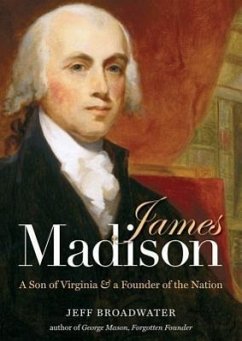James Madison is remembered primarily as a systematic political theorist, but he was also a practical politician who strove for balance in an age of revolution. Broadwater focuses on Madison's role in the battle for religious freedom in Virginia, his contributions to the adoption of the Constitution, his place in the evolution of the party system, his relationship with Dolley Madison, his performance as a wartime commander-in-chief, and his views on slavery. No single figure can tell us more about the origins of the American republic than our fourth president. In these pages, Madison emerges as a remarkably resilient politician and an unlikely wartime leader who survived repeated setbacks in the War of 1812 with his popularity intact. Yet Broadwater shows that, despite his keen intelligence, the more Madison thought about race, the more muddled his thinking became, impeding his ability to grapple with the dilemma of American slavery.

"Trotz tausend Fehlern und Pannen" habe James Madison als amerikanischer Präsident "mehr Ruhm erworben und mehr Einheit geschaffen" als seine drei Vorgänger zusammen. Diese Bilanz zog John Adams in einem Brief an Thomas Jefferson; da schrieb also einer der drei Vorgänger an einen weiteren. Anders als Adams hielt allerdings mancher Historiker die Präsidentschaft Madisons für mittelmäßig oder misslungen. Fehler und Pannen gab es unter Madison in der Tat einige, als die junge Republik den "Krieg von 1812" gegen das einstige Mutterland England führte, ohne dass eine Seite in zweieinhalb Jahren einen Vorteil erreicht hätte. Dass die Amerikaner den unentschiedenen Ausgang damals als Erfolg sahen, hebt nun Jeff Broadwater ebenso hervor wie die Bewahrung der Bürgerrechte - und nennt Madison in letzterer Hinsicht den "größten Kriegspräsidenten der amerikanischen Geschichte". In sieben Kapiteln zu Wegmarken seiner Karriere gelingt ein differenziertes Bild des 1751 geborenen Madison. So erfährt man zum Wort vom "Verfassungsvater" Madison auch, dass der Entwurf nie ratifiziert worden wäre, wenn Madison 1787 im Verfassungskonvent von Philadelphia all seine Vorschläge - etwa zur Sitzvergabe nach Bevölkerungszahlen in beiden Häusern des Kongresses - durchgebracht hätte. Als ein Autor der "Federalist"-Artikel warb Madison dann aber für die Annahme der Verfassung und formulierte mit Alexander Hamilton und John Jay die Grundlagen des politischen Denkens der Vereinigten Staaten. (Jeff Broadwater: "James Madison". A Son of Virginia and a Founder of the Nation. University of North Carolina Press, Chapel Hill 2012. 266 S., Abb., geb., 24,99 [Euro].)
grae
Alle Rechte vorbehalten. © F.A.Z. GmbH, Frankfurt am Main
